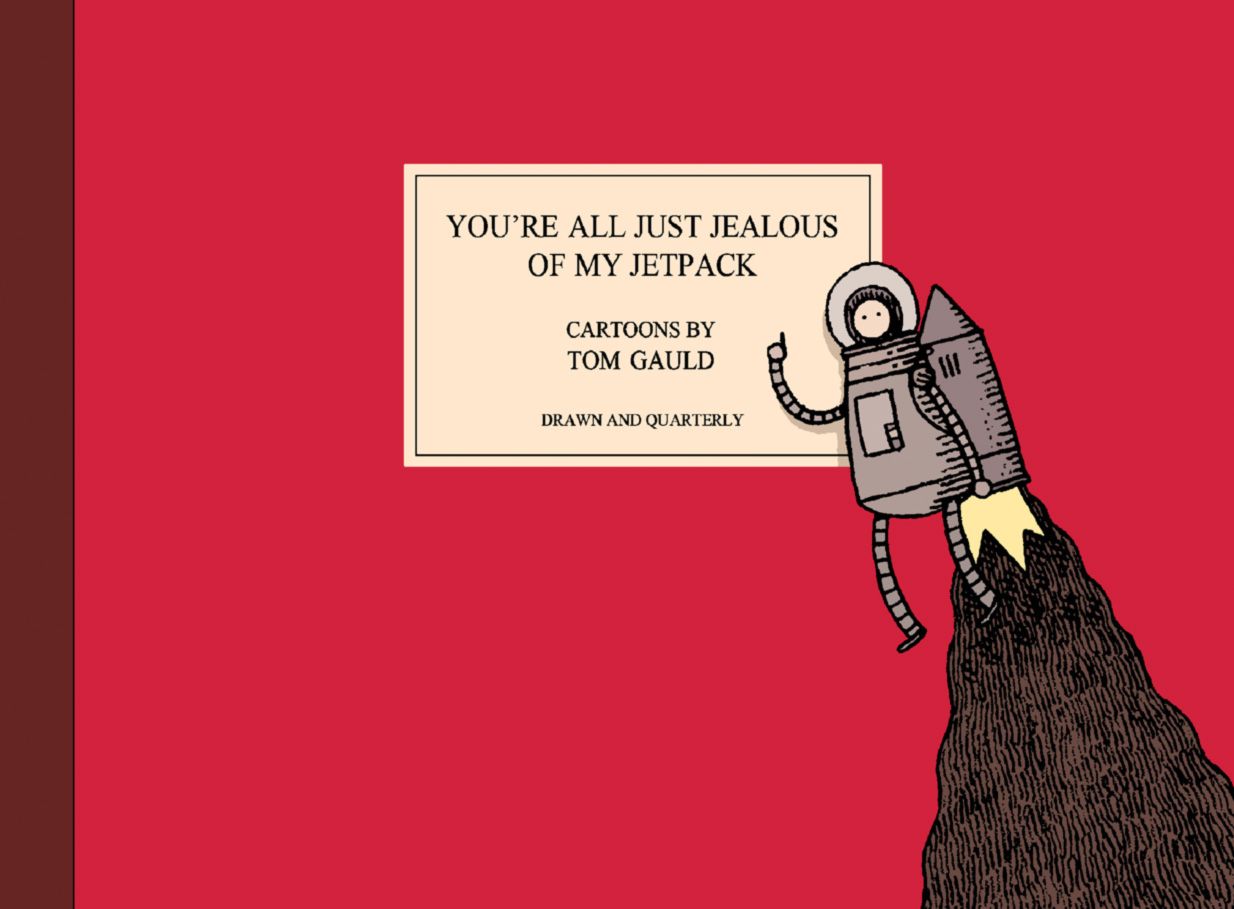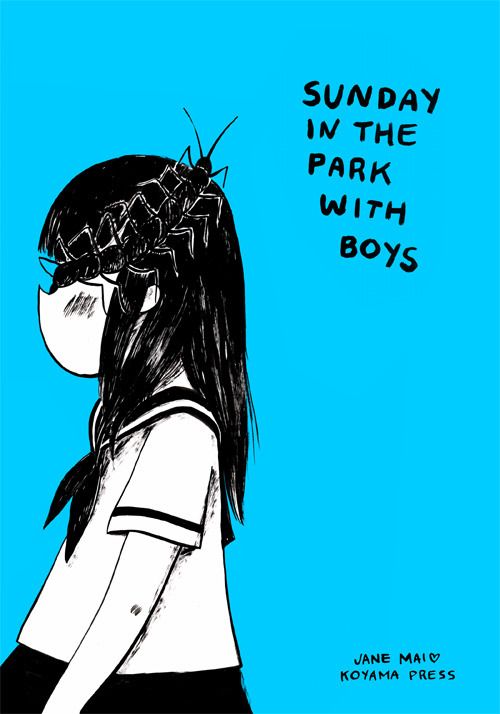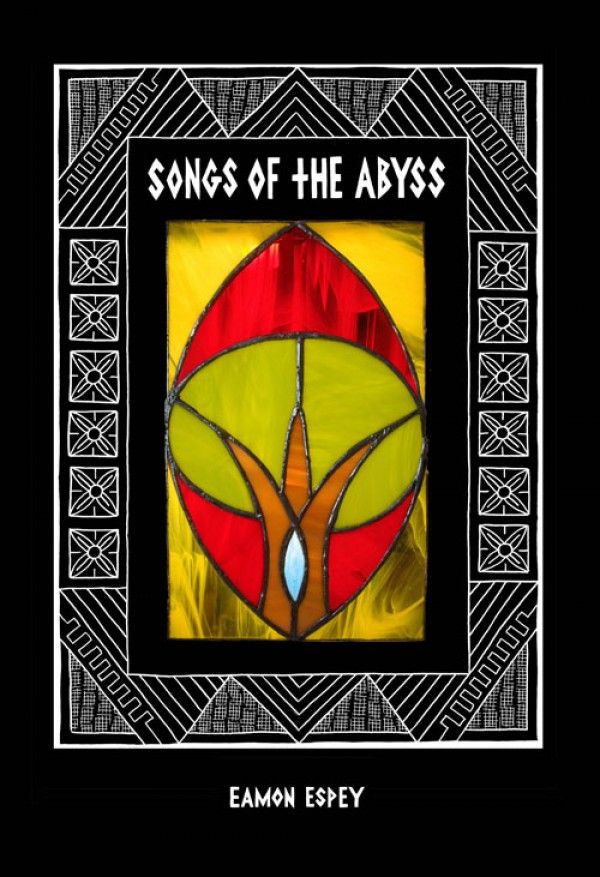Note: My schedule has been all goofy lately which means I haven't been able to post on a regular weekly basis or contribute to Cheat Sheet or What Are You Reading in the manner I'd like to. I know: Wah, wah, wah.
Meanwhile, the books keep piling up. And piling up.
So, in an effort to assuage my guilt, I attempted to run through some of the titles I've received in the mail in the past few months. Warning: I might do this again. I might not. I'm mercurial.
You're All Just Jealous of My Jetpack by Tom Gauld (Drawn & Quarterly)
As appreciative as I am that we live in an era when cartoonists are encouraged to, and do, create lengthy, thoughtful, multi-layered stories, there's something to be said for the simple pleasures of a gag strip – the fleeting joy that a really short, well-constructed joke can provide. I didn't realize how much I missed that sort of thing until I read You're All Just Jealous of My Jetpack, a collection of short strips that cartoonist Tom Gauld did for The Guardian. The bulk of the strips play upon classic stories, genre fiction or publishing in general. Gauld's jokes are are silly enough and play upon familiar cliches well enough to make the reader feel smart even if you haven't read, say, Zola's "Germinal." His minimalist, silhouetted style helps get the joke across as well. He's also rather fond of diagrams and maps, which puts him in good company with folks like New Yorker cartoonists Roz Chast and Jack Ziegler I didn't care much for Gauld's last book, Goliath, which I thought milked a rather weak joke (gosh, the Biblical Goliath was actually a really nice guy!) but Jetpack had me frequently laughing out loud in the way that only my favorite comic strips do. Comics need more of this sort of "get in, get out quick" work right now and I'm happy that Gauld is here to fill that void.
Sunday in the Park With Boys by Jane Mai (Koyama Press)
Self-loathing autobiography is nothing new to indie comics, and there's little ground Mai covers in this slim comic that hasn't been covered before. Still, Mai does a very good job capturing how depression and anxiety (here depicted as creepy-crawly insects) can spiral and isolate you completely from friends, family and the rest of the world in general ("Why don't you see your friends any more?" "Because they're busy not being fuck-ups."). Rather than attempt some sort of overall, heavily detailed account of her dark days, she opts instead to focus on individual moments, giving the comic a poetic, impressionistic lilt I appreciated. Yeah, it's a "sad" comic, but it's far from a depressing read.
The ZZZZZZ Series and Other Stories by Michael McMillan (Picturebox)
I first came across McMillan's work in an old issue of Young Lust (great underground-era anthology, by the way). It was one of the standout stories of that particular issue, as I recall, even though I had no idea who the particular cartoonist was at the time. Now, thanks to this oversize, newspaper-print release by Picturebox, I have a name to put with the sequential images.
ZZZZZZ is a collection of one-page, wordless strips, frequently absurdist and nonsensical in nature, though they have an internal comic logic that, while it might not make real-world sense, delight nevertheless. For instance: Two pilots of opposing armies go off to war only to end up in the beds of their respective mates. A woman dresses as a Greek goddess and then fires an arrow through the neck of a seeming mafioso. A man dreams of his beloved while climbing a mountain, only to find her at the top of the mountain, dressed in pajamas. A man treks through a hazardous jungle, but is saved by Mandrake the Magician. A lot of these stories play upon issues of sex and gender, though not in any sort of explicit or overtly sexual fashion. McMillan has a pop art style that's really appealing however. I really liked these comics and I'd like to see more of McMillan's comics reprinted in the near future.
Songs of the Abyss by Eamon Espey (Secret Acres)
Few cartoonists are able to completely skeeve me out as well as Espy does. His bug-eyed, manic-faced, potato people are the stuff great nightmares are made of. They always seem like they're on the verge of committing some horrible, disgusting crime and frequently do. In fact, in this book we find none other than Santa Claus himself going on an extremely violent shooting rampage (apparently inspired by a true-to-life story).
With his heavy use of symbolism, labyrinthian motifs and deliberate avoidance of perspective or realism, Espy's style is strongly influenced by a lot of mythological art from non-Western cultures, especially those of Mexican and South America (think Incan, Mayan, etc.). Here he tries to create his own series of world-building myths with mixed results. Part of the problem is that Espy seems to be interested in one side of the picture. There's plenty of blood, evisceration and body fluids, as befitting any classic myth, but there's little wonder or hope. Deeper knowledge only results in greater horror. Even the Greeks, who could be as bleak as fuck, knew to leaven their stories with a bit of humor or acknowledge that joy and happiness are not completely .
Not in Espy's universe (True, the title of the book should have been a tip-off). Even the act of sex seems like a grotesque activity made for unworthy beings. Espy is a unique and interesting artist but his world view, at least as portrayed in his comics thus far, is a bit too bleak for my tastes. A little goes a long way with me.
DNA Failure by Leon Sadler, Stefan Sadler and Jon Chandler (Picturebox)
This is an odd book. It sort of resembles a jam comic, with the two Sandlers and Chandler rotating the art and story chores every ten pages or so. The story (or is it stories) deal with a group of adventurers, tramps and lowlifes in a seemingly medieval European world, though supernatural and fantasy elements pop up occasionally as well. There's no real plot per se, or rather there are several plots that get picked up and dropped off, as various characters bump into each other and are quickly forgotten. Despite the moments of dungeon crawling and monster-battling, this is no tried and true D&D-infused tale with a hip, sly attitude, a la Dungeon Quest (and no slight meant toward DQ there). The art is too rough, stiff and simplistic to be effective in that regard. It's not even really interested in the sort of otherworldly fantasy explorations that Brian Chippendale or Mat Brinkman indulge in frequently. Honestly, this book kind of stymied me. There are parts I liked or at least felt like they were heading towards something but overall it felt like all the disparate parts just jumbled together into something of a mush. It's too weird to appeal to straight-up fantasy fans and it's too mired in genre to interest the avant garde. Bottom line: I'd be more interested in seeing these artist working on their own individual comics than collaborating together.



